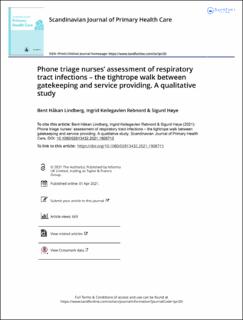Phone triage nurses’ assessment of respiratory tract infections – the tightrope walk between gatekeeping and service providing. A qualitative study
Journal article, Peer reviewed
Published version

Åpne
Permanent lenke
https://hdl.handle.net/11250/2768662Utgivelsesdato
2021Metadata
Vis full innførselSamlinger
Originalversjon
Scandinavian Journal of Primary Health Care. 2021, 39 (2), 139-147. https://doi.org/10.1080/02813432.2021.1908715Sammendrag
Background
Phone nurses triage callers to Norwegian out-of-hours cooperatives to estimate the appropriate urgency and level of care for the caller. Many callers with mild symptoms of respiratory tract infections receive a doctor’s consultation, which may lead to busy sessions and in turn impair clinical decisions.
Objective
This study explores how phone triage nurses assess callers with mild-to-moderate symptoms of respiratory tract infections and their views and experiences on triaging and counselling these callers.
Methods
We conducted four focus groups with 22 nurses (five men and 17 women aged 24–66 years) in three different locations in Norway. The interviews were transcribed verbatim and analysed by systematic text condensation.
Results
The informants were reluctant to call themselves gatekeepers. However, their description of their work indicates that they practice such a role. When nurses and callers disagreed about the right level of care, the informants sought consensus through strategies and negotiations. The informants described external factors such as organisational or financial issues as decisive for the population’s use of out-of-hours services. They also described callers’ characteristics, such as language deficiency and poor ability to describe symptoms, as determining their own clinical assessments.
